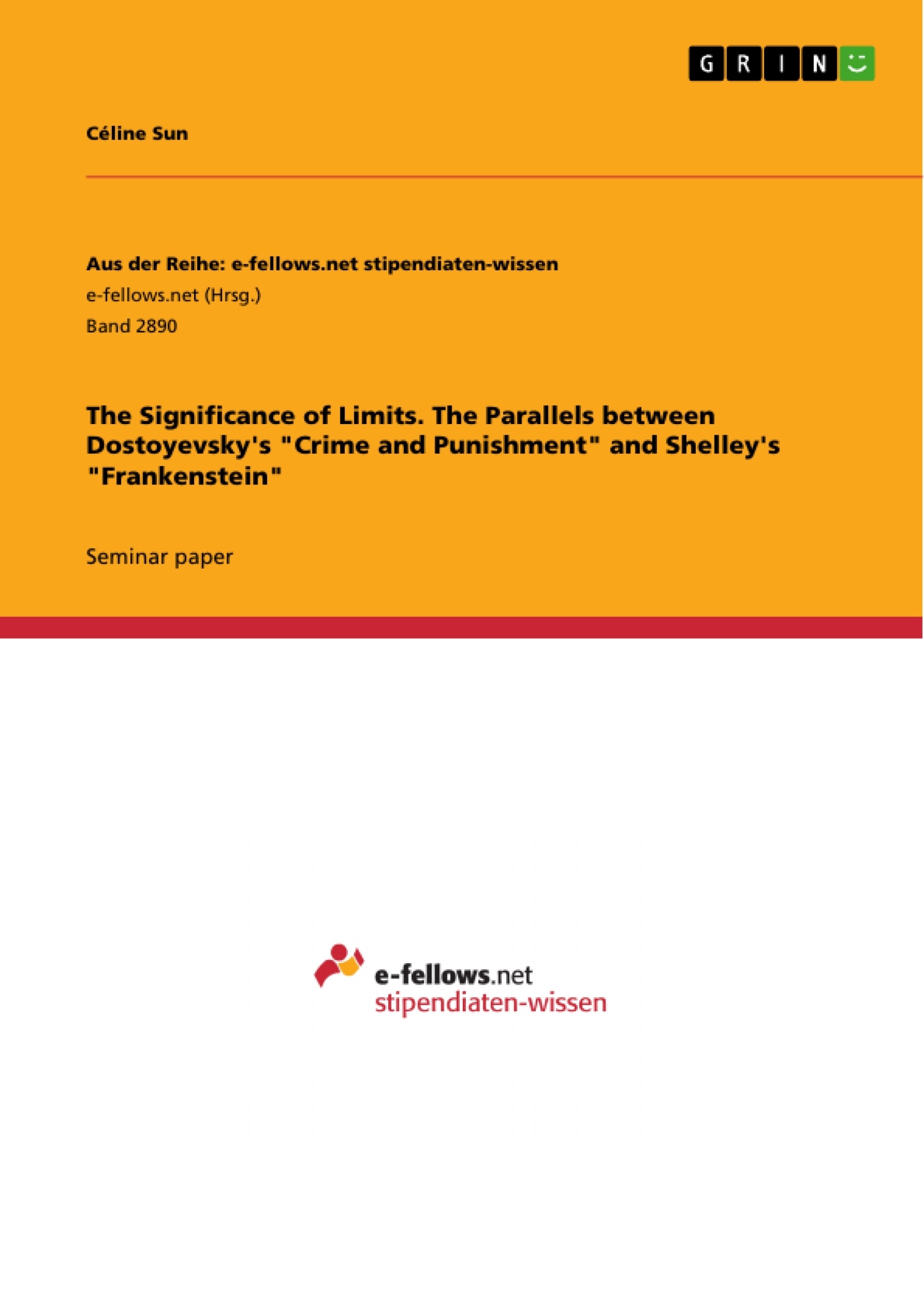The transgression of limits is a central theme of the novels by Dostoyevsky and Shelley. The stories examine the world of thought and action of two characters feeling trapped within certain limits and trying to break through them, while in their failures other limitations manifest themselves. These different levels add to a total picture reflecting the limits of a consciousness that seeks to overcome its own finitude – manifested in the embodiedness of the self and the factual resistance of the world – through the assertion of the self, but ends up trapped within itself. The stories eventually culminate in the realization that only the opening towards a genuine other can lead out of the entrapment within the self and factuality, and open up a dimension in which the embodied world and every single consciousness is given meaning and value.
I will show that the inner conflict of the two characters is essentially the same, despite the different personal convictions of the authors – Dostoyevsky as a conflicted Christian, Shelley in her critical opposition to religion – and that because of this difference, a resolution of the conflict is possible only in one case. Both authors place their figures in an ultimately profane world from which the latter have alienated themselves to the core of their existence and essence. The opening of the self towards an other is crucial for reconciliation – interhuman relation, however, is also met with limitations within the embodied world. The (im)possibility of overcoming these, at last, is not only conveyed through the content of the stories but concretely realized in the distinctive form of their narrative.
Inhaltsverzeichnis (Table of Contents)
- Introduction
- Limits for the Profane Mind
- Empathy and Morality
- Sexuality and Mortality
- Overcoming Limits: Self-Absolutizing
- Reason and Ethics
- Science and Spirit
- Limits in a Secular World
- Overcoming Limits: Transformation through the Other
- Image and Language
- Dialogue and Grace
- Conclusion: Transcendence in-and-beyond the Embodied
Zielsetzung und Themenschwerpunkte (Objectives and Key Themes)
This text examines the themes of transgression and overcoming of limits through the lens of two literary works: Dostoyevsky's *Crime and Punishment* and Shelley's *Frankenstein*. It focuses on the internal struggles of the main characters as they attempt to break free from perceived limitations, both within themselves and the world around them. The text ultimately suggests that true liberation comes from embracing genuine connection with others rather than seeking self-absolutizing.
- The transgression of limits in literature
- The tension between individual will and societal norms
- The role of empathy and morality in human relationships
- The influence of scientific ambition on our perception of life and death
- The importance of connection and transcendence through the "other"
Zusammenfassung der Kapitel (Chapter Summaries)
- Introduction: The introduction sets the stage for the analysis by highlighting the central theme of transgression of limits in the two novels. It introduces the characters of Raskolnikov (*Crime and Punishment*) and Frankenstein (*Frankenstein*), both struggling to break free from perceived limitations. The introduction establishes the overarching argument that true liberation comes from connecting with others, not through self-assertion.
- Limits for the Profane Mind: This section delves into the initial limitations faced by both characters. In *Crime and Punishment*, Raskolnikov grapples with his complex relationship with morality. He exhibits empathy but struggles to extend it universally, ultimately justifying his crimes through a warped ethical system. In *Frankenstein*, Frankenstein's fear of death and his rejection of sexuality drive him toward scientific ambition. The text argues that Frankenstein's ambition is fueled by a desire to conquer the finitude of the embodied world, leading him to create the monster who symbolizes his own repressed desires.
- Overcoming Limits: Self-Absolutizing: This section examines how both characters attempt to transcend their limitations through self-assertion and individual will. Raskolnikov adopts a philosophy that elevates his will above societal norms, justifying his crimes as a means to a greater good. He rejects empathy as weakness and embraces a utilitarian approach to ethics. Frankenstein, driven by scientific ambition, seeks to overcome the limitations of mortality through the creation of life. These attempts to transcend limitations through self-absolutizing are ultimately shown to be flawed, leading to further entrapment and alienation.
Schlüsselwörter (Keywords)
The text focuses on the themes of limits, transgression, empathy, morality, self-absolutizing, science, spirituality, and the role of the "other" in achieving transcendence. It draws upon literary analyses of Dostoyevsky's *Crime and Punishment* and Shelley's *Frankenstein* to explore these concepts, offering insights into the human struggle to overcome limitations both internally and externally.
- Citation du texte
- Céline Sun (Auteur), 2018, The Significance of Limits. The Parallels between Dostoyevsky's "Crime and Punishment" and Shelley's "Frankenstein", Munich, GRIN Verlag, https://www.grin.com/document/449020



